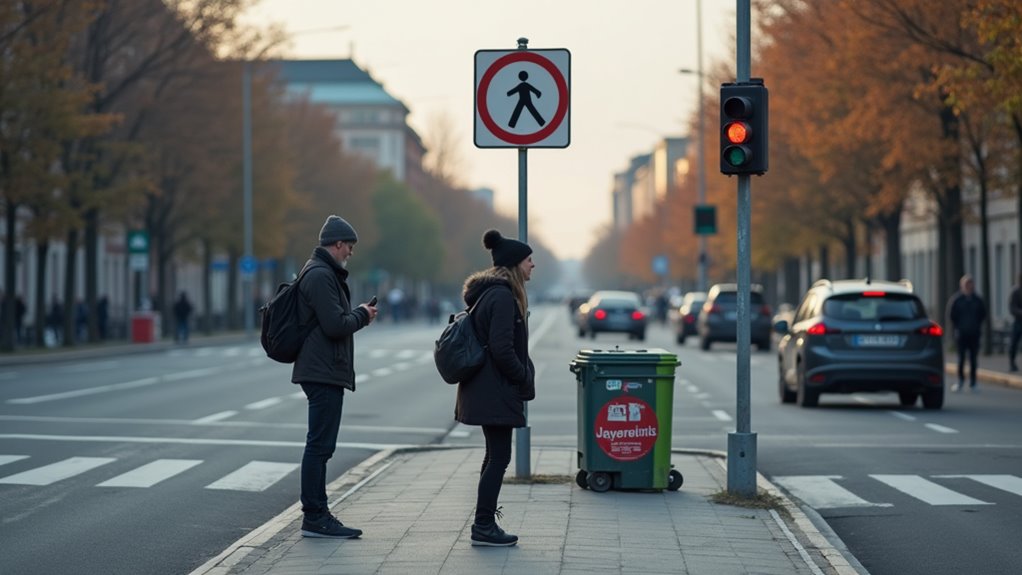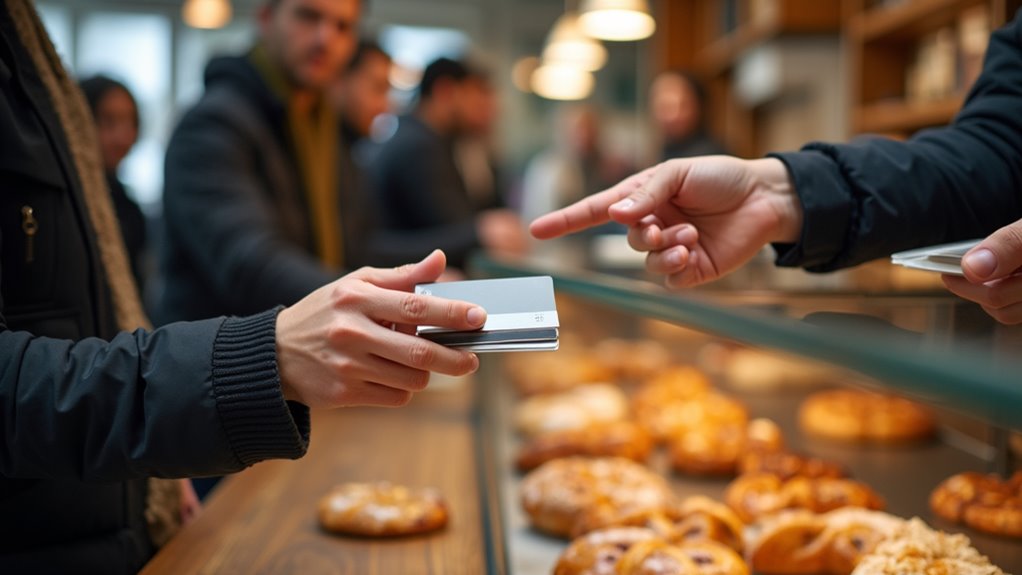Physical Address
304 North Cardinal St.
Dorchester Center, MA 02124
Physical Address
304 North Cardinal St.
Dorchester Center, MA 02124

Missteps in German etiquette can shock locals, from jaywalking to tardiness—discover what behaviors will mark you as a clueless tourist.
In Germany, never cross streets on red lights, keep gum out of conversations, and don’t put feet on furniture. Don’t start eating before everyone’s served or keep hands in pockets during conversations. Always knock before entering rooms, carry cash for smaller establishments, and recycle properly according to strict guidelines. Being punctual is essential—aim to arrive 5-10 minutes early for appointments. Follow these cultural norms to blend in seamlessly and discover more nuances of German social etiquette.

While Americans might casually jaywalk without a second thought, in Germany, crossing the street during a red light is a cultural faux pas that locals take seriously. You’ll notice Germans patiently waiting at crosswalks even when no cars are coming – this isn’t just about safety, it’s about social responsibility.
Beyond risking a €5 fine, you’ll likely face disapproving glances from locals if you ignore the rules. Running a red light for longer than 1 second is considered a serious traffic violation with legal penalties under German law. Germans value order and consider traffic signal compliance a reflection of respect for community standards. They’ve instilled this behavior through education from childhood. Unlike in Switzerland where traffic rules vary by canton, Germany maintains consistent pedestrian regulations throughout the country.
The strict adherence to traffic signals has practical benefits too – Germany’s road safety record is impressive because of this collective discipline. When you’re visiting, follow the locals’ lead. Wait for the green “Ampelmännchen” before crossing, even at 3 AM on an empty street.
Moving from street behavior to social interactions, German communication norms require careful attention to detail. When engaging in conversation with Germans, you’ll want to avoid chewing gum, which is perceived as disrespectful and unprofessional. Germans value focused, attentive communication and interpret actions literally—your gum-chewing signals disinterest in what they’re saying. Similarly, keeping your hands in pockets during conversation is considered impolite and casual in German culture. Understanding cultural expectations will help you navigate social situations more successfully in Germany.
This seemingly minor habit can considerably impact how you’re perceived, potentially affecting both personal and professional relationships in Germany.

German homes and public spaces follow a level of cleanliness that may surprise visitors from more casual cultures. Placing your feet on furniture, whether shoes on or off, is considered disrespectful and unhygienic in Germany.
This norm extends beyond private homes to restaurants, hotels, and public lounges. Even in casual settings, resist the urge to prop your feet on chairs or tables. The only exceptions are designated footstools or ottomans specifically designed for this purpose.
The taboo stems from Germany’s emphasis on respect and proper decorum in social situations. Your behavior reflects your regard for others’ property and personal boundaries. Losing your composure by arguing about these expectations would be seen as a sign of weakness and further damage your social standing.
When in doubt, observe locals and follow their lead. In contrast to the relaxed atmosphere you might find in historic Split, Germans maintain stricter boundaries regarding personal space and property. Remember that maintaining these standards of cleanliness and respect will help you integrate seamlessly into German social settings.
One of the quickest ways to stand out as a foreigner at a German dining table is to plunge into your meal before everyone has been served. Germans consider it impolite to begin eating until all diners have their food and the host has signaled it’s time to start, often with “Guten Appetit.” This practice demonstrates respect for both your fellow diners and the communal nature of the meal.
Remember to pace yourself throughout the meal, keeping in rhythm with others at the table. Unlike American customs, Germans typically use both knife and fork for most foods, including items Americans might eat with just hands or a fork. This communal dining approach differs significantly from the Icelandic cuisine traditions, which often feature individual portions of distinctive seafood dishes. This collective dining approach reflects Germany’s value of group harmony and social etiquette.

While minding your table manners will help you blend in socially, preparing for Germany’s payment preferences will save you from awkward moments at checkout counters.
Despite being a technological powerhouse, Germany remains surprisingly cash-oriented, with over half of all transactions still conducted in cash. Don’t assume your cards will be accepted everywhere. Small businesses, bakeries, local markets, and many cafés often reject cards entirely or require minimum purchase amounts. Even some public offices no longer accept cash payments!
Always carry €50-100 in small denominations when venturing out, especially in rural areas or at weekend markets. ATMs can be scarce and occasionally run out of cash on weekends. While debit cards are gaining ground for larger purchases and tourist areas are increasingly card-friendly, Germany’s cash culture persists. Mobile payment usage has tripled from 2021 to 2023, indicating rapid digital adoption is happening but hasn’t replaced cash yet.
Two-thirds of Germans actively want to keep it this way. This cash preference stands in stark contrast to European neighbors like Norway, which has embraced nearly cashless systems in most establishments.
Punctuality in Germany isn’t just a preference—it’s practically a cultural cornerstone. Being 5-10 minutes early for appointments shows respect and preparedness, while tardiness can strain relationships and professional opportunities. Germans view punctuality as a reflection of reliability and consideration for others’ time. The German phrase “Fünf Minuten vor der Zeit” encapsulates this cultural value, emphasizing the importance of arriving early rather than risking lateness. This cultural expectation differs significantly from the more relaxed approach found in affordable Croatian destinations, where a more Mediterranean attitude toward time prevails.
To navigate German punctuality expectations successfully:
If you’re unavoidably delayed, call ahead to explain. This courtesy shows respect for the cultural norm even when you can’t meet it perfectly. Remember, in professional settings, repeated lateness could impact your reputation and advancement opportunities.

In contrast to some Western cultures, Germans take their public appearance seriously, viewing casual dress as potentially disrespectful in many contexts. Leave your sweatpants, pajamas, and flip-flops at home unless you’re heading to a gym or beach.
While jeans and sneakers work for casual settings, “casual” in Germany often means smart-casual. Business environments expect polished footwear, dress shirts, blouses, and slacks. In professional settings, avoid flashy accessories and loud patterns. Wearing athleisure wear as everyday clothing is generally uncommon and may signal incorrect socio-economic status to locals.
Remember that specific contexts have their own rules – bring a towel for saunas where nudity is expected, and pack modest clothing (covered shoulders/knees) for religious sites. When in doubt, it’s better to slightly overdress than appear too casual.
Urban areas like Berlin may tolerate edgier styles, but rural regions generally prefer conservative attire. This formality differs significantly from the relaxed Mediterranean culture you might experience when visiting Greece or Croatia.
Germany’s strict recycling laws make proper waste sorting non-negotiable for residents and visitors alike. Mixing materials in the wrong bins isn’t just frowned upon—it’s illegal under the Circular Economy Act. You’ll need to separate glass, paper, plastics, bio-waste, and general trash correctly or face potential fines and social disapproval. Companies must register with the LUCID Packaging Register before selling packaged goods in Germany.
Recycling incorrectly in Germany is both a social faux pas and a legal violation carrying real consequences.
Unlike neighboring Scandinavian countries, Germany has implemented some of the most comprehensive recycling systems in Europe. When in doubt, ask a local rather than guessing. Germans take recycling seriously as both environmental responsibility and legal obligation.

While gesturing during conversation comes naturally to many cultures, keeping your hands in your pockets while speaking to Germans can send unintended negative signals. This habit is widely perceived as casual, disinterested, or even arrogant across German-speaking regions.
In business settings, this seemingly innocent gesture can damage professional relationships. Germans value visible hands as they convey engagement and respect. The same cultural norm applies in other Germanic countries like Austria and Switzerland. Even if locals don’t overtly react to your hands-in-pockets stance, they might privately consider it impolite. This etiquette differs significantly from what you might experience in Turkey’s hottest cities, where more relaxed body language is often acceptable in casual conversations.
Instead, keep your hands visible—folded in front of you or at your sides. This is especially important in formal situations where proper etiquette matters.
German business culture embraces directness and efficiency, meaning small talk that’s common in countries like the US or UK often falls flat in formal German settings. When meeting German colleagues or business partners, it’s best to get straight to the point rather than chatting about the weather or weekend plans. Germans typically view excessive small talk as a waste of valuable time and potentially insincere. In professional environments, Germans maintain a hierarchical structure that influences communication styles and meeting protocols. Unlike French culture which embraces more social conversation before business, Germans prefer to maintain clear boundaries between professional and personal life.
Maintaining appropriate formality shows respect for German business customs and helps establish your credibility as a serious professional.

In a culture that deeply values privacy, entering rooms without knocking first is considered one of the most disrespectful behaviors you can display in Germany.
Always knock before entering any room with a closed door—even if it’s slightly ajar. Wait for a verbal “Herein” (come in) or “Darf ich?” (May I?) before stepping inside.
This applies equally to office spaces, private homes, and shared accommodations. Remember that respect for privacy is a fundamental aspect of German culture.
Germans typically keep doors closed for practical reasons like noise reduction and energy efficiency, not because they’re being unfriendly.
Failing to respect this boundary can damage both personal and professional relationships.
The only exception is during genuine emergencies. Otherwise, assume that closed doors are physical extensions of personal boundaries that shouldn’t be crossed without permission.
By following these German cultural norms, you’ll navigate the country with respect and confidence. It’s worth noting that 98% of Germans wait for the green light before crossing—even at 3 AM on empty streets! Remember, what might seem overly formal or structured to you is simply the German way of creating social harmony and efficiency. Adapt to these customs, and you’ll enjoy a much smoother experience in Deutschland.